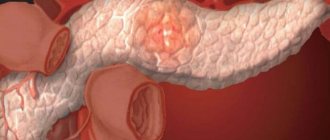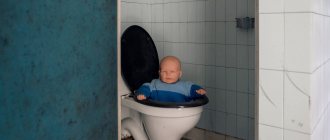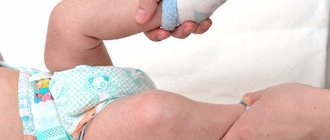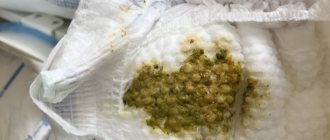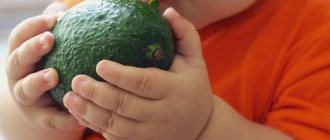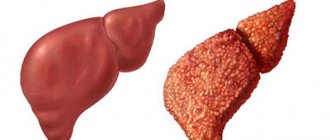Characteristics of the disease
Encopresis is a disease in which the child is unable to independently control the process of bowel movement , resulting in involuntary release of feces.
That is, encopresis is considered to be fecal incontinence. Often this pathology is accompanied by enuresis (urinary incontinence), which further worsens the child’s quality of life.
In the anus there are special sphincters that prevent the involuntary release of feces. Disruption of their work (developmental anomalies, damage) leads to the inability to retain feces, resulting in its unintentional release.
ICD 10 code – F 98.
Why does a child feel sick after eating? Find out the answer right now.
Normal or pathological?
A young child is unable to control the activity of the intestines and, accordingly, the periods of bowel movement. That is why unintentional defecation is considered a normal condition .
Over time, as the child's digestive system completes its formation, involuntary fecal release becomes increasingly rare. In particular, at the age of 1.5-2 years , the child is already able to hold back bowel movements for some time.
It is during this period that many parents begin to potty train their baby. In some situations, involuntary bowel movements persist into later life. For example, if a child is busy with something exciting for him, he may not pay attention to the urge to have a bowel movement.
This situation can also be considered a variant of the norm, but only if isolated cases .
If unintentional defecation occurs constantly in children over 3-4 years of age, we are talking about a pathological phenomenon.
Causes
A variety of unfavorable factors, both physiological and psychological, can lead to the development of this disease. So, encopresis in a child develops as a result of:
- Incorrect potty training (when parents try to instill this skill in a child who, due to age or other conditions, is not yet ready for this).
- Inability to go to the toilet at the right time.
- Unstable emotional state , stress associated, for example, with a lack of parental attention, an unfavorable situation in the family, a sharp change in the usual daily routine and living conditions (entry to kindergarten, school, change of place of residence).
- Frequent constipation (for example, if a child is embarrassed to go to the toilet in unfamiliar places, or cannot do this during a long trip). In this case, the accumulated feces stretch the intestinal walls, this condition becomes habitual for the body, reflexes weaken, and at the most unexpected moment an unintentional bowel movement occurs. This situation is also observed if the child, for some reason, experiences pain during bowel movements.
- Impaired intestinal motor function , leading to stagnation of feces. In this case, fermentation processes begin in the intestines, as a result of which a foul-smelling liquid is produced, which, bypassing the sphincters, is released through the anus.
- Irritable bowel syndrome.
- Traumatic injury to the spine and spinal cord, which is responsible for the development of control over bowel movements and urination.
- Epileptic seizures, during which the child cannot control the process of bowel movement.
- Congenital or acquired disorders of the structure of the large intestine , ruptures of its tissues.
- Mental illnesses and developmental disorders, for example, depression, dementia.
- Infectious diseases.
- Brain damage and dysfunction.
As a result, the baby develops a fear of the potty and a reluctance to visit the toilet to fulfill the natural needs of the body.
Classification
Depending on the causes and characteristic symptoms, it is customary to distinguish true and false forms of encopresis.
The true form of the disease is quite rare.
Develops as a result of disorders of the brain, for example, with traumatic brain injury, strong emotional experiences , untreated infectious diseases.
False encopresis is a more common type of this disease.
Most often it occurs as a result of chronic constipation, in which the intestines are constantly filled with feces (for example, if a child consciously suppresses the desire to go to the toilet over a long period of time).
Treatment
How to cure encopresis? Therapy for encopresis should be comprehensive , combining psychotherapeutic and medicinal methods. The choice of treatment depends on the cause of the disease.
Drug therapy
Depending on what caused the disease, the doctor selects medications. The following types of drugs are used:
- Probiotics to normalize the digestive process. These are Acipol, Bifiform, Linex.
- Neurometabolic agents (nootropics). They influence higher mental functions. These are medications such as: Piracetam, Pyridoxine, Phenotropil.
- Laxatives : Microlax, Guttalax. It is used as a last resort when emergency bowel movement is required, and other means do not help. It is not advisable to give your baby senna-based laxatives.
Physiotherapy
Physiotherapeutic methods are effective for encopresis that develops as a result of constipation. The following activities are prescribed:
- Cleansing enema . Has a training effect on the intestines. 500 ml of liquid, preferably chamomile decoction, should be injected into the intestines. Then the child must hold the water inside for a while using the sphincter.
- Electrical stimulation of the sphincter with a tube.
- Physical exercise . Physical activity stimulates intestinal peristalsis.
Diet and daily routine
To normalize stool, it is necessary to adjust the patient's nutrition . The child's diet should contain a lot of fiber, vegetables, fruits, and fermented milk drinks. Coarse dietary fiber is found in cereals, bran, prunes, and whole grain bread.
Fermentation in the intestines and constipation are provoked by: baked goods, sausages, fast food, sweets. Therefore, such products are prohibited.
The child should be taught to visit the toilet regularly in order to have bowel movements in a timely manner. It is advisable to do this after eating, after a walk. You can’t rush your baby, he may need 10-15 minutes, gradually he will learn to do it faster.
To overcome the fear of the toilet room, it needs to be equipped accordingly.
It should smell nice there, you can bring toys, books there, and come up with interesting tasks.
For every small success, the child must be praised and encouraged.
ethnoscience
Traditional medicine is used at home in combination with traditional methods after consulting a doctor.
Laxative herbal decoctions and soothing teas are prescribed :
- decoction of motherwort, valerian,
- lavender essential oil. Can be added to the bath before bedtime,
- Buckthorn decoction has a laxative effect,
- a mixture of carrot and beet juice, prune decoction also prevent constipation.
Symptoms and signs
The clinical picture of encopresis in a child can be different. This depends, first of all, on the form of the pathology.
| True encopresis | False encopresis |
|
|
In most cases, the pathology develops rather slowly (a rapid increase in symptoms is extremely rare). That is why it is not always possible to identify the disease at an early stage of its development.
Many parents begin to sound the alarm only when the signs of the disease become very pronounced (for example, the child has a discharge visible on the underwear, the baby is bothered by irritation and itching in the anal area caused by constant contact of the skin with feces).
Read about the symptoms and treatment of Crohn's disease in children here.
Types of encopresis
Fecal incontinence in a child can occur in the following situations:
- Congenital defects lead to disruption of the formation of the conditioned reflex of fecal excretion.
- Features of the body, which include the slow consolidation of the conditioned reflex of bowel movement and urination.
- External causes leading to the loss of a conditioned reflex (trauma, surgery, mental illness).
In any of these cases, damage occurs to the nerve control centers or the sphincter apparatus of the rectum.
Depending on the reasons that underlie the disease, fecal incontinence comes in two forms: organic and functional.
Organic form
Rarely seen. It occurs in a child as a result of complications after operations on the abdominal or pelvic organs (purulent-inflammatory processes, damage to the rectal sphincters), which damage the neuromuscular apparatus of the rectum. Another reason is a fracture of the pelvic bones and/or damage to the spinal cord. With organic fecal incontinence in a child, the normally formed conditioned bowel movement reflex is lost. The loss may be partial or complete.
Functional form
This form occurs when the functioning of one of the nerve centers or the obturator apparatus of the rectum (internal and external sphincters) is disrupted in the absence of defects in the anatomical structures. Occurs in childhood in most cases.
Depending on the mechanisms that underlie the formation of functional fecal incontinence, several clinical types are distinguished:
True encopresis
This species is also called daytime, nocturnal or mixed. Fecal incontinence develops when there is a central disruption in the functioning of the retaining apparatus of the rectum, which occurs under the influence of certain causes.
Be sure to read: Klebsiella in the stool of a baby: symptoms, treatment and prognosis for the child
Causes
- mental factors (stress, emotional lability), they can be obvious or hidden, affect the child for a long time or once, occasionally;
- birth injury;
- fetal asphyxia;
- perinatal infections.
The listed unfavorable factors can lead to the loss of a normal conditioned reflex in a child that has already been formed. In other situations, there is deliberate incontinence of feces in inappropriate places while maintaining psychological control over the act of defecation. Perinatal damage to the central nervous system can lead to the formation of birth defects in the structures that are responsible for the obturator process of the rectum.
Symptoms
True encopresis develops gradually. In the initial stages, a child’s stool is regular and independent. As the condition progresses, stool appears, which is not controlled by the child. Over time, the independent act of defecation stops and constant fecal incontinence appears. The child has difficulties in social adaptation in children's groups, and his linen gets dirty. The child becomes untidy, other children stop playing with him, and the traumatic situation worsens. In the anal area, the skin is constantly irritated by fecal matter, painful sensations and maceration appear. There are no abdominal pains.
False encopresis
Another name for false encopresis is paradoxical or obstipational. In this case, stool smear occurs when the large intestine is overfilled with feces, which increases pressure in the rectum and puts pressure on normally functioning sphincters. Overcoming the resistance of the obturator apparatus of the intestine, the child unconsciously releases solid or liquid feces.
Causes
First of all, the causes of intestinal constipation, the symptom of which is obstipative encopresis, are distinguished:
- Hirschsprung's disease;
- irritable bowel syndrome;
- errors in nutrition;
- food allergic reactions;
- intestinal dyskinesia, etc.
Symptoms
Paradoxical fecal incontinence is clinically no different from the manifestations of true encopresis, but it is associated with other symptoms of constipation. Spotting appears at the height of constipation and may be accompanied by abdominal pain. The skin may be gray in color, the tongue is covered with a white coating. The child develops bad breath. The abdomen is enlarged and growls. When the bowels are emptied, there is no fecal incontinence. Mental and neurological abnormalities with this type of encopresis are often not detected.
Mixed encopresis
Against the background of paradoxical fecal incontinence, the child develops neurosis-like disorders, and the nature of encopresis becomes mixed.
Diagnostics
Which doctor should I go to? If encopresis is suspected, the child must initially be shown to a therapist .
In the future, consultations with other specialists, for example, a gastroenterologist or psychologist, may be required. This is necessary to establish the exact cause of the disease.
To determine the disease, it is necessary to collect an anamnesis, examine the patient, and palpate his abdomen. In some cases, additional diagnostic research methods , such as:
- bacteriological culture of biological material (feces, urine, blood);
- X-ray of the intestine;
- colonoscopy;
- Ultrasound of the abdominal organs.
Treatment options
How to treat encopresis in children at home? Therapy is complex. In particular, the child is prescribed medications (their list depends on the form and manifestations of the disease), special physical exercises, and adherence to a certain diet and diet.
Traditional recipes can also be used as additional methods of treatment.
Among other things, the child needs qualified help from a psychologist, since this disease causes serious emotional discomfort to the child.
Drugs
Medicines must be prescribed with great caution , because the child’s digestive system is already suffering, and incorrectly prescribed medications can only aggravate the situation.
To treat encopresis in children, medications that have a laxative effect (for example, Duphalac) are prescribed.
The course of treatment is 1-2 weeks. This drug helps eliminate constipation , which is one of the most common causes of encopresis.
In the future, the baby will need maintenance therapy, that is, taking milder laxatives (Lactulose, Psyllium).
plant-based sedatives are prescribed (if the child has significant psychological abnormalities associated with the presence of this disease).
Folk remedies
The use of traditional medicine will enhance the therapeutic effect provided by medications.
Thus, herbal teas and decoctions will help calm the baby and eliminate the psychological cause of the development of the disease.
The following recipes are recommended:
- A decoction based on motherwort, mint, hop cones, and valerian root . All ingredients (2 tsp each) are mixed, pour 200 g. boiling water, heat in a water bath for 20 minutes. After this, the volume is again brought to 200 ml, filtered and cooled. The decoction is given to the child 3 times a day, 0.5 cups.
- 1 tbsp. mint leaves are brewed with boiling water . If desired, you can add a little honey. This remedy must be taken 2 times a day, 1 glass.
Diet therapy
Maintaining a proper diet is an important point in the treatment of encopresis .
Thus, the child is strictly prohibited from consuming fatty and fried foods, semolina and rice porridge, fatty meats and fish, rich broths, baked goods, and legumes.
The basis of the diet is light vegetable soups, cereal porridges, fermented milk products, fruits and vegetables. It is recommended to limit the consumption of sweets, which are better replaced with prunes or dried apricots.
It is important to pay attention not only to the list of products, but also to the method of preparing dishes. A child should not be given fried foods; it is recommended to give preference to such cooking methods as steaming, stewing, boiling, and baking.
In addition, are contraindicated ; dishes should be crushed as much as possible, preferably in the form of purees.
Psychological support
A child suffering from encopresis experiences significant emotional discomfort and therefore is in great need of psychological help.
In particular, parents should not blame the child for not being able to control bowel movements and soiling his pants.
It is important to establish a trusting and friendly relationship with your baby, to let him know that you still love him. Many sick children become withdrawn, so it is not so easy to establish contact with them.
In this case, the help of a qualified psychologist and special trainings are needed, in which not only the child himself, but also people close to him should take part.
Physical exercise
A special set of exercises will strengthen the sphincters of the anus, the muscles of the pelvic floor and the anterior abdominal wall, and improve intestinal motility.
So, the child needs to squeeze his buttocks tightly, hold them in this position for a few seconds, and then relax.
The exercise must be repeated as often as possible during the day. Special breathing exercises , involving deep, long inhalation and slow exhalation.
Recommendations for parents
In some cases, adults will have to completely reconsider their educational principles regarding hygiene, and sometimes their general approach to relationships with the younger generation.
Attempts to put pressure on the child, to shame him, to force him to do laundry and clean up after himself aggravate the trauma. He will only experience feelings of humiliation, guilt and shame. It is necessary to show understanding, patience, and be as affectionate as possible with the baby in order to create a sense of security in him. Constant moral and emotional support is needed until the awareness of his need for his family and immediate environment is firmly entrenched in the child’s unconscious.
Be sure to read: What does perianal scraping reveal and how is it performed?
Recommendations for communicating with children suffering from encopresis:
- Stay close to your son or daughter for 20 minutes after going to bed. Even if the baby is sleeping, it is important to tell him about your love.
- Increase self-esteem with praise for any action that requires approval.
- Talk about what happens to him, without avoiding anatomy and physiology. Even at 3 years old, a child understands a lot, he just cannot express it.
- Negative events in the family should not be taboo; the child can and should be told about what is happening, using accessible language. It is important to avoid any judgments. The truth should not be colored by the attitude of one of the parents to the situation.
- Eliminate open and emotional conflicts in the presence of the baby. He can understand a lot, but the screams of mom and dad cause fear.
- Remove from free access films, cartoons and books that evoke strong negative emotions, excite, or unbalance.
- Switch the child's attention to calmer games - the additional impact on the nervous system during sedation has a negative effect.
- Get into the habit of going to bed only after the intestines have been emptied.
- Build a daily routine and strictly follow it - stability creates a sense of security.
In continuation of the topic, be sure to read:
- Causes of bloating and increased gas formation, treatment methods
- Psychological constipation in a child 2-4 years old: methods of overcoming
- Worms in children: how do they manifest themselves and what drugs to treat them with?
- Details about the coprogram: preparation, conduct and interpretation of the analysis
- Mucus in a child’s stool: causes and what to do?
- Rectal cancer: symptoms, stages, treatment and prognosis for life
- More about hemorrhoids: causes, symptoms and treatment methods
- Rectal fissure: causes, symptoms and treatment of pathology
- Food allergies in children: symptoms and treatment (diet, medications)
- How to behave after a hearty lunch: good and bad habits
Be sure to read:
Yeast found in a child’s stool: is it dangerous and is treatment necessary?
Doctor Komarovsky's opinion
Encopresis, which occurs in young children, is a normal phenomenon that occurs as a result of imperfections in the child’s nervous and digestive systems .
Over time, the situation resolves itself. However, if this does not happen by 4-5 years, you need to contact specialists.
In some cases, it is enough to simply eliminate the effect of the provoking factor ; in others, the child needs complex treatment.
Symptoms
- high quantitative composition of feces in the intestines, which can be detected using a rectal examination, abdominal examination, pelvic cavity examination;
- loose stools;
- unpleasant odor from the patient (rotten or fecal origin);
- discomfort near the navel;
- rarely there is a large amount of discharge of solid excrement;
- children display behavior that is characterized by aggression or depression;
- Infections and inflammation of the urinary tract are possible, which do not respond to treatment for a long time.

